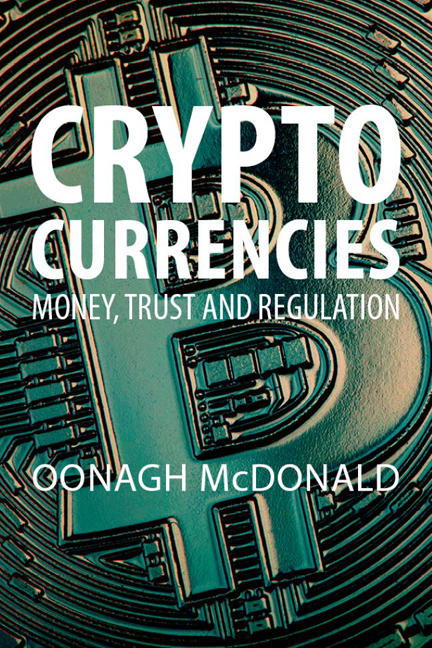Book contents
- Frontmatter
- Contents
- Preface
- Acronyms
- 1 Introduction: Bitcoin beginnings
- 2 New cryptocurrencies and new developments
- 3 Stablecoins: the search for stability
- 4 Initial coin offerings: the “Wild West”
- 5 The regulatory response to ICOs
- 6 Global stablecoins: Libra
- 7 Reactions to stablecoins
- 8 Central banks and central bank digital currencies
- 9 The decline of cash
- 10 Credit and trust
- 11 Epilogue: the crypto winter
- Appendix: smart contracts
- Notes
- Index
8 - Central banks and central bank digital currencies
Published online by Cambridge University Press: 22 December 2023
- Frontmatter
- Contents
- Preface
- Acronyms
- 1 Introduction: Bitcoin beginnings
- 2 New cryptocurrencies and new developments
- 3 Stablecoins: the search for stability
- 4 Initial coin offerings: the “Wild West”
- 5 The regulatory response to ICOs
- 6 Global stablecoins: Libra
- 7 Reactions to stablecoins
- 8 Central banks and central bank digital currencies
- 9 The decline of cash
- 10 Credit and trust
- 11 Epilogue: the crypto winter
- Appendix: smart contracts
- Notes
- Index
Summary
As the world of digital currencies continues to develop, so has the work of central banks and other institutions seeking a deeper understanding of the benefits and risks involved in digital currencies, particularly the use of DLT to provide a faster and more efficient means of payment that might benefit the public. A number of pilot test projects, or proof-of-concept projects, using a consortium of financial institutions under the auspices of the regulatory authority were instigated in 2016. One such project is Project Jasper launched back in 2016 by the Bank of Canada, the Toronto Stock Exchange and the R3 Group.
Project Jasper consisted of three phases: Phase I, from March to June 2016, was designed to investigate the use of central bank-issued receipts for deposited currency to support settlement on a DLT developed and built by the Project Jasper team. Phase II, from December 2016 to April 2017, was a private–public initiative to explore a wholesale payment system, using DLT, which found that a stand-alone payments system was not as useful as a centralized payments system in terms of core operating costs. Phase III was concerned with an integrated payments and securities infrastructure. Project Jasper concluded that the proof-of-concept was too limited, since it did not apply to exchange-traded equities after novation and netting by the Canadian Depository for Securities. Instead, it created a loose integration of the large transfers system and the CDS for equities. Andrew McCormick, Vice President of Payments and Technology at Payments Canada, commented that “it is less about the technology … it's more about the regulatory, the legal and the monetary issues”.
Project Ubin, set up by the Monetary Authority of Singapore (MAS), was a collaborative project in 2016 to explore the use of DLT for clearing and settlement of securities and payments. Its report concluded that the key technological issues had been resolved for clearing, settlements and payments processing for domestic payments and could become “more efficient, if only common standards and common platforms were in place”. But a key challenge in achieving a common international platform for cross-border payments is the “question of governance and ownership”.
- Type
- Chapter
- Information
- CryptocurrenciesMoney, Trust and Regulation, pp. 139 - 162Publisher: Agenda PublishingPrint publication year: 2023



